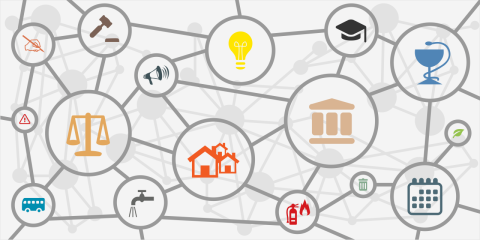
Local and regional administrations are, in many cases, at the forefront of delivering key public services. To what extent can this be efficiently done in lagging regions? How can infrastructure and services be adapted to local needs in these types of areas? The Hungarian Presidency of the Council, the ESPON programme and the OECD will present the results of recent studies, which will showcase data analysis and innovative examples from local and regional administrations all across Europe.
- Territorial | Urban | Rural | Local and regional | Governance and Public administration | Cohesion | Demographics (depopulation and ageing) | Social inclusion and Equality
- Code: 08WS241170
- Jacques Delors building, JDE 70
Speakers
Practical information
- When
-
Tue 08/10/2024, 14:30 - 15:30 CET
- Where
- Jacques Delors building, JDE 70
- Type of partnership
- Partnership
- Format
- Workshop/ panel debate
- Theme
-
Regions strengthening European Democracy
- Language
- English

Partner

ESPON EGTC
Documents
Reporting
Session summary
The European Pillar of Social Rights stipulates that everyone has the right to easy-to-use and affordable key services, including water, sanitation, energy, transport, financial services and digital communications. The first-ever European Commission’s "Access to Essential Services in the EU" report published in June 2023 highlighted various country experiences and indicated that people at risk of social exclusion and disadvantaged groups face particular challenges
ESPON and OECD have engaged in further understanding the territorial dimension of service delivery; the sessions explored main findings of recent research efforts.
The OECD research (2024) “Getting to Services in Towns and Villages” looked at the interaction between geography and access to services. The study, for instance, concluded that towns and villages located farther from cities tend to provide more services than similar-sized settlements closer to cities, as residents near cities often access services in the city itself rather than in their smaller suburban locations.
ESPON DESIRE project brings in a wealth of innovative examples on how service delivery can be ensured in challenging territorial circumstances. The analysis of innovative solutions applied across European lagging regions shows that while digital technologies play a major role, physical access to services of general interest may still be ensured by effective cooperation, creativity and by thinking out of the box.
The Hungarian Presidency provided a concise overview on the current government's approach in addressing service delivery. The Catching-up Settlements Programme (Felzárkózó Települések Program, known as FeTe programme), was presented which is a large-scale programme to address social issues in marginalized rural settlements and communities situated in lagging regions of the country. It has proved to be an effective instrument thus far, for instance, the component of the FeTe programme, called Health Development Program – Telemedicine for the Most Deprived Settlements won the REGIOSTARS 2024 award of the European Commission in the category of Social and Inclusive Europe.
Quotes
-
While service provision alone may not be able to counteract negative demographic trends, ensuring transport connectivity -especially through public transport - to towns and villages providing essential services can help promote access for everyone
Transferring services to different contexts is a complex process but there are available alternatives. Understanding the interplay between technological infrastructure, community engagement, legal frameworks and local capacity is critical
For the sake of equal accessibility and balanced territorial development, the state should undertake the provision of a National Territorial Minimum level of public services related to the everyday needs of citizens
Additional links
https://www.oecd.org/en/publications/getting-to-services-in-towns-and-villages_df1e9b88-en.html
https://www.oecd.org/en/topics/demographic-change-in-regions.html
https://www.oecd.org/en/topics/rural-service-delivery.html
https://www.oecd.org/en/topics/regions-cities-and-local-statistics.html



